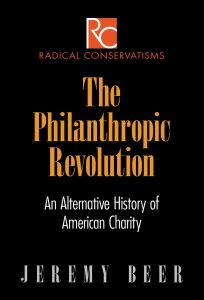
by Jeremy Beer.
University of Pennsylvania Press, 2015.
Hardcover, 124 pages, $20.
In The Philanthropic Revolution, Jeremy Beer succeeds in his two-pronged effort to delineate charity from philanthropy, both in their actual practice and in their distinct origins, and to expose the long-ignored skeletons of philanthropy’s deep, historical closets. All of this, achieved in no more than 110 pages, is a testament to Beer’s intellectual acuity. Delicately balancing descriptive, historical narration and normative analysis, Beer portrays philanthropy’s protracted effort to effectively crowd out traditional charity while emphasizing the importance of those “personalist” goods that were lost in the caustic conflict.
Beer quickly sets himself apart from what he perceives to be the three primary intellectual tendencies in looking at philanthropy. These are the laudatory Whig, the highly cynical Marxian- and Foucauldian-inspired, and the balanced, although skeptical, liberal perspectives to philanthropy. Beer rightfully finds these approaches to be inadequate, as they lack the theological grounding needed to truly appreciate charity contra philanthropy, and also speak little to the concerted effort since the Enlightenment to associate what is religious—which includes charity itself—with that which is irrational and backward.
To emphasize charity’s historical difference from other forms of aid, Beer notes that giving, in the Western world, was initially the product of Greco-Roman “philanthropia,” patronage and informal assistance among friends and family. However, the former two sources of aid were often born less of some moral impetus than from a desire to garner public favor and to obtain financial gain, often by exploitative arrangements. It was Christian “caritas,” done not least for the salvific purpose of “laying treasure up in Heaven,” that led to the sprouting up of charitable institutions during the early centuries of the first millennium and far beyond.
The second dimension missing from most previous work of considering the secular assault on charity, Beer argues, began with the Protestantism’s adoption of sola fide, the doctrine that salvation may be achieved by faith, and by faith alone. This is a crucial (and controversial) point for Beer to make, as it allows him to explain why so much of the thought done on giving in America, a Protestant-majority country, would emphasize the same distinction made by Andrew Carnegie between the “deserving” and “undeserving poor” (even as these terms fell into disuse). Because on this view charitable action did not assist in one’s salvation, the objects of the charity could be graded and valued according to other, mostly secular, criteria. Of course, there is an abundance of Protestant-inspired charitable works in America, which remains a very generous country, but the intellectual history Beer develops shows how Protestant assumptions regarding charitable work allowed charities to be coopted by secular initiatives. Modern notions of efficiency came to suspect that the human-scale concerns and methods of traditional charity were unfounded. As such, historical opposition to charity was often undertaken in concert with, or as a result of, anti-Catholic bigotry throughout much of the nineteenth and twentieth centuries.
In fact, much of the harm done to Catholic families during this time was inflicted by the work of philanthropic institutions. The American Female Guardian Society, for instance, pushed for a truancy law in New York that allowed for children to be separated from their families by the state, and “a large majority” of those affected were Catholics. Such atrocious movements—not least the twentieth-century eugenicist movement—resulted from philanthropy’s aim to radically mold society as if it were a collection of cogs, bolts, and pins that could safely be taken apart, oiled, and put back together. Beer provides ample evidence of this tendency in philanthropic thought, whether it be in the form of Bill Gates neglecting to help the homeless outside of his offices in favor of supporting “systemwide” change, or in the form of Great Awakening preachers’ calls to reform and transfigure society.
Knowing this, however, is not enough to apprehend exactly why this “scientific” understanding of helping others either fails with respect to its own measures of efficacy or leads to outcomes that are clearly abhorrent to any common-sense morality. The reason given by Beer is epistemic: “a vast sweep of human knowledge is practical and tacit rather than theoretical and explicit. The ancient Greek word for this kind of knowledge is mētis.” Beer argues that a combination of the recognition of this tacit knowledge with “personalist” goods, which the philosophy of philanthropy as of now eschews, can form an alternative approach to giving that he dubs “philanthrolocalism.” This new approach posits “that the primary purpose of philanthropy ought to be to increase opportunities for and strengthen the possibilities of authentic human communion” and operates in accordance with three main principles: that we are all of a community, that we must look over that which is close to us, and that modernity has done much to destroy local culture. Ultimately, such a framework necessitates a focus on giving locally and taking our cues from the worldly farmer of Brueghel’s Landscape with the Fall of Icarus by sticking to the familiar soil beneath us without the conceit of reaching for the clouds above.
In considering Beer’s new philanthropy, there is a question of allocation. Do we have any means, other than intuition, to determine a rough approximation of how much of our time and resources should go to those in need near us as opposed to those in need much farther away? Not all communities are in a position to further human communion on their own, and certainly an emphasis on propinquity doesn’t preclude a care for those distant to us. Further, it is hard to argue that suffering is anything but intrinsically bad; this makes one question the weight of our obligation to advance human community in our proximity compared with alleviating global suffering, as those like Peter Singer stress. Beer’s personalist localism provides a beginning answer to those questions of balance by reminding us where charity begins—at home.
Brad Langhoff is an Economics student at Fordham University.